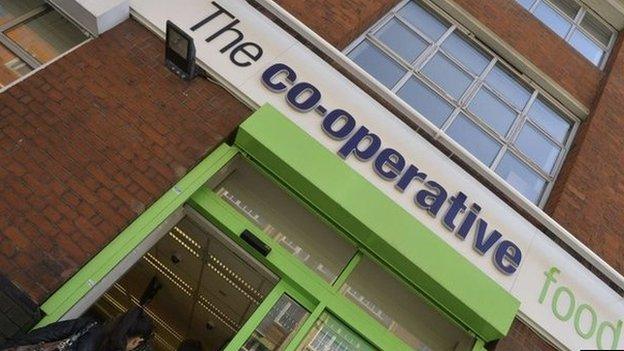Co-op Group members approve governance shake-up
- Published
Former City minister Lord Myners welcomes a unanimous vote by members of the Co-op Group to back broad reforms to the way the organisation is run.
Co-op Group representatives have voted unanimously in favour of one of the biggest overhauls in the way the 150-year-old British mutual is run.
At a special meeting in Manchester, delegates approved a motion calling for elected board directors and greater powers for individual members.
It broadly reflects proposals by ex-City minister Lord Myners, who called the Co-op "manifestly dysfunctional" following a series of failures.
The group lost £2.5bn last year.
The Co-op, one of the UK's largest mutuals, has been mired in controversy, with its banking arm facing near-collapse last year, and the resignation of chief executive Euan Sutherland in March.
Co-op Group's chair, Ursula Lidbetter, welcomed Saturday's vote, calling it a "highly significant moment" for the organisation.
She added: "There is a huge task ahead of us if we are to deliver the reforms necessary to restore the group's reputation and return it to health, but the board will work hand-in-hand with our members to ensure that we seize this opportunity."
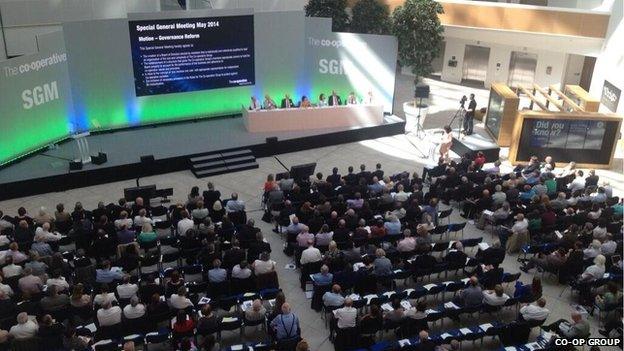
The Co-operative Group's meeting took place in its new head offices in Manchester
Following the vote, Lord Myners told the BBC his "work here is done," and that he was thrilled by the unanimous approval.
He said it marked a "turning point" for the group.
Four proposals
Following the standard annual meeting, a special session was held to vote on a motion containing the following four proposals, which reflect some suggestions made by Lord Myners in his report , externalthis month:
The creation of an elected board of directors, comprising people with relevant experience to run an organisation like the Co-op
The establishment of a structure that gives Co-op members powers to hold the board to account
Moving to a "one member, one vote" system, in which members can directly vote on policies
The introduction of rules to protect against de-mutualisation
That motion was backed by Co-op Group chair Ms Lidbetter and interim chief executive Richard Pennycook.
In a statement, the Group said a sub-committee of the board "will now take forward the principles and work on the detail of a new rule book for the Society, to be implemented as soon as possible".
The business secretary Vince Cable said the vote for reform was "a step in the right direction".
"It is important mutuals are strengthened as an alternative business model," he said, "and the Co-op is a major part of that movement".
There had been concerns among some members that the changes could damage the ethos of the Co-operative movement.
But John Gorle, from the shopworkers' union Usdaw, said the vote was an "opportunity to take the business forward".
He added: "We now have the foundations in place to put together a new governance structure that will strengthen the organisation and help safeguard our members".
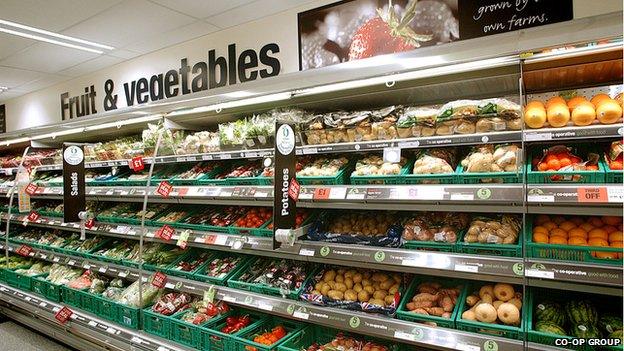
There is a Co-op food store in every UK postal area
'Business calamities'
Earlier this month, a review of the group by Lord Myners concluded the board was "manifestly dysfunctional".
The report, external suggested replacing it with a smaller board made up of people with business experience.
Lord Myners called the Co-op Group "one of the great national business calamities", and said "radical decisions on governance structure need to be taken very soon - and with resolution - if the Co-op, as my mother knew it, is to be saved".
He added that elected members would have to show "selfless sacrifice" to push the reforms through.
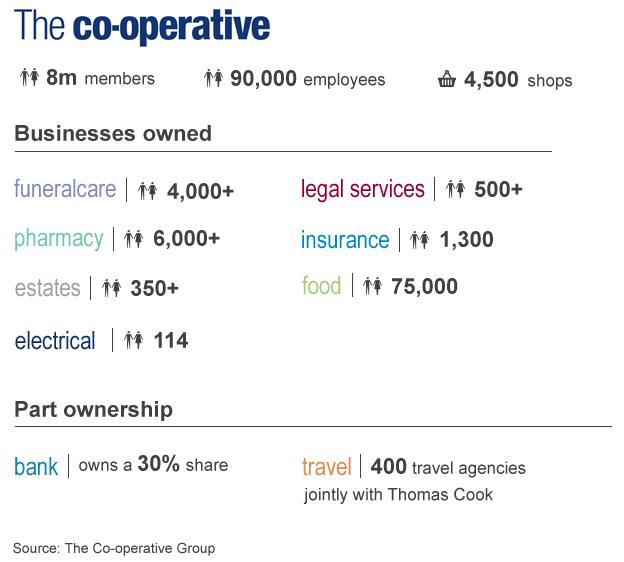
Euan Sutherland, who resigned as boss of the Co-op Group in March after 10 months in the job, said the organisation was "ungovernable".
Fall from grace
Co-op Group's former chief executive, Sir Graham Melmoth, who stepped down in 2002 having been credited with reviving the organisation's fortunes, told the BBC "most people will find something that they can generally support" in the motion.
Meg Hillier MP and Patrick Gray from Midcounties Co-operative discuss the future of the group
But Sir Graham insisted that governance reforms were "almost secondary" to battling the levels of indebtedness at Co-op Group, with the banks "sitting on the neck" of the beleaguered mutual.
Although the Co-op has nearly eight million members, making it Britain's largest mutual, only around 160 attended Saturday's meetings.
They included representatives of the regional Co-ops, elected by members, and delegates from independent co-operative societies.
The Co-op also announced a new "Group Purpose", external at the meeting, with the slogan: "Championing a better way to do business for you and your communities".
- Published16 May 2014

- Published17 April 2014
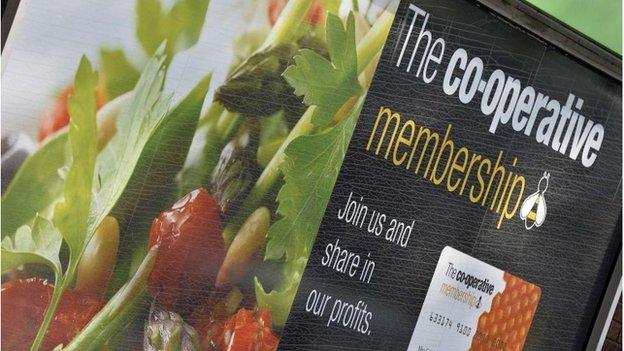
- Published7 May 2014
